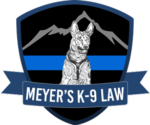Traffic Stop; Prolonged Detention
During early morning surveillance of a parking lot of a closed business known to be a “high-drug area”, LE saw the subject drive up to a subject on a bicycle. They conversed, but when they saw LE, they quickly parted ways, suggesting to LE that “something may be amiss”. LE called for back up and followed the vehicle to an open business, where subject parked and went into the business. Subject spoke to a person in the business for a few minutes and then came out and drove away. At that time, LE noticed that the vehicle did not have a license plate or license plate light. It had an illegible paper in the window that could have been a temporary permit, but LE could not read it. LE stopped the vehicle for these violations. Subject did not have proof of insurance when asked by LE. Subject was extremely nervous (more than normal), avoided eye contact, and his hands were shaking. Subject tried to reach into his pockets twice, despite being warned by LE, and LE performed a consent Terry frisk. No weapons or contraband were found. Subject initially denied his travels but admitted it after being confronted that LE was observing him. When asked about “marijuana, cocaine and heroin”, subject quickly denied possession. When asked about methamphetamine, subject hesitated and said no, but admitted to using a year or two ago. When asked to show his tongue, LE noted signed of recent meth use. The bicyclist and the employee were contacted and they told a different story as to the contact they had with subject. At this point, a PSD team was requested which arrived about 37 minutes later (after subject had been detained for approximately 15 minutes). PSD alerted quickly to the vehicle; search of vehicle revealed methamphetamine and indicia for use and sale.
Subject’s motion to suppress was denied. The appellate court held that the traffic stop was legally justified and that the stop was not unduly prolonged because the facts described above gave LE additional reasonable suspicion that additional crimes (possession, possession for sale) were afoot. Quoting Brown v. Texas (1979) 443 U.S. 47 at 52, the court noted that “(a) trained and experienced officer may be able to perceive and articulate meaning in given conduct which would be wholly innocent to the untrained observer.”
Note: The Brown language is a good reminder that LE’s training and experience is critical. While it may feel boring and redundant to list your experience and training, it is important that the court understand that you have the requisite training and experience to draw the conclusions that add up to the court making a finding that innocent seeming behaviors, taken one by one, actually add up to additional reasonable suspicion. Keep those hero sheets up to date and make sure the prosecutor has an update copy.
